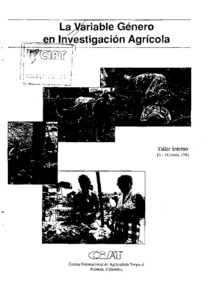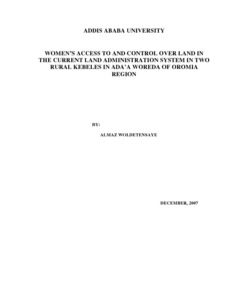Propiedad de la tierra
AGROVOC URI:
Rural finance and agricultural technology adoption in Ethiopia: does institutional design matter?
Financial cooperatives and microfinance institutions (MFIs) are the two major sources of rural finance in Ethiopia. Whereas MFIs are relatively new, financial cooperatives have existed for centuries in various forms. The coexistence of two different institutions serving the same group of people, and delivering the same financial services, raises several policy questions. Those questions have become particularly relevant, as the government has embarked on developing a new strategy for improving rural financial services delivery.
Shared Control of Natural Resources (SCOR) spatial database for planning and monitoring resource use change
Social impact of canal irrigation: a review of 30 years of research. IWMI-TATA Water Policy Research Program Annual Partners' Meet, 2002
Taller Interno La Variable Género en Investigación Agrícola (1991, Palmira, Colombia). La variable género en investigación agrícola
Tank rejuvenation in Karnataka: why it should be a community based approach? IWMI-TATA Water Policy Research Program Annual Partners' Meet, 2002
Tenancy and irrigation water management in South-Eastern Punjab, Pakistan
The evolving landscape of REDD+ projects
The landscape of REDD+ projects varies significantly across countries, reflecting differences in land tenure systems, drivers of deforestation, recent experience with conservation programmes and governance capacity. Indonesia appears to have the most REDD+ projects in the pipeline, with a substantial portion seeking to establish additionality, permanence and a legal claim to carbon by obtaining concessions. In Brazil, two common strategies are to initially seek carbon credits from afforestation or reforestation and to develop local-level payments for environmental services (PES) schemes.
Water implications of foreign direct investment in Ethiopia's agricultural sector.
Ethiopia is often highlighted as a country in which a lot of foreign land acquisition is occurring. The extent to which these investments also constitute significant acquisitions of water is the subject of this paper. It is apparent that water availability is a strong driver of the recent surge of investments in agricultural land globally, and in general the investments occur in countries with significant 'untapped' water resources. Ethiopia is no exception.
Water implications of large-scale land acquisitions in Ghana.
This paper examines the water dimensions of recent large-scale land acquisitions for biofuel production in the Ashanti, Brong-Ahafo and Northern regions of Ghana. Using secondary sources of data complemented by individual and group interviews, the paper reveals an almost universal lack of consideration of the implications of large-scale land deals for crop water requirements, the ecological functions of freshwater ecosystems and water rights of local smallholder farmers and other users.
When REDD+ goes national: a review of realities, opportunities and challenges
The development of national REDD+ strategies has progressed. Common challenges include establishing appropriate national institutions that link into ongoing processes; ensuring high level government commitment; achieving strong coordination within governments and between state and non-state actors; designing mechanisms to ensure participation and benefit sharing; and establishing monitoring, reporting and verification (MRV) systems. The different agendas of actors involved in policy formulation at the national level reflect those at the international level.
Women’s access to and control over land in the current land administration system in two rural kebeles in Ada’a Woreda of Oromia Region
The study is designed to explore the status of rural women in access to and control over land in the current land administration system in two rural Kebeles in East Shewa Zone Ada’a Woreda of Oromia region on smallholder farmers’ landholding registration. The Ormia National Regional State Rural Land Administration and Use Proclamation and its implementation procedure are examined from a gender perspective in terms of ensuring rural women’s land holding rights and control they have over land.



